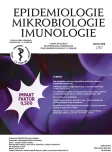-
Medical journals
- Career
Immune status in patients with subclinical forms of genitourinary tuberculosis
Authors: P. Nencka 1; R. Zachoval 1,2,3; M. Vašáková 4; E. Kopecká 4; J. Wallenfels 5; P. Čermák 6,7
Authors‘ workplace: Urologická klinika, Fakultní nemocnice Královské Vinohrady a 3. lékařská fakulta, Univerzita Karlova, Praha 1; Urologické oddělení, Thomayerova nemocnice, Praha 2; Urologická klinika, 1. lékařská fakulta, Univerzita Karlova, Praha 3; Pneumologická klinika, Thomayerova nemocnice a 1. lékařská fakulta, Univerzita Karlova, Praha 4; Národní jednotka dohledu nad TBC, Nemocnice Na Bulovce, Praha 5; Oddělení klinické mikrobiologie, Thomayerova nemocnice, Praha 6; Ústav laboratorní diagnostiky, 3. lékařská fakulta, Univerzita Karlova, Praha 7
Published in: Epidemiol. Mikrobiol. Imunol. 67, 2018, č. 2, s. 55-57
Category: Original Papers
Overview
The study aim was to determine whether there is a correlation between subclinical forms of genitourinary tuberculosis (GUTB) and immune status. All patients admitted to the Pneumology Clinic of the Thomayer Hospital, Prague with lung tuberculosis (LTB) were enrolled in the study. The study group consisted of 102 patients, 75 males and 27 females, median age of 46.8 years. In a previously published part of the study, 6.9 % of LTB patients were diagnosed with subclinical forms of GUTB. In the present part of the study, immune status was determined in patients with subclinical forms of GUTB by measuring circulating immunoglobulin G and CD4 T cell levels. The comparison of the immunological results did not show a statistically significant difference between the patients diagnosed with GUTB and other LTB patients..
Keywords:
tuberculosis – genitourinary – CD4 T cells – immunoglobulin
Sources
1. Zumla A, George A, Sharma V, et al. The WHO 2014 global tuberculosis report – further to go. The Lancet Global Health, 3(1):e10–e12.
2. Ústav zdravotnických informací a statistiky ČR. Tuberkulóza v ČR. [online]. 2018-01-19. Dostupný na www: http://www.uzis.cz/category/tematicke-rady/zdravotnicka-statistika/tuberkuloza-cr.
3. Kolek V, Kašák V, Vašáková M. Pneumologie, 2. rozšířené vydání. Praha: Maxdorf; 2014.
4. Zachoval R, Nencka P, Vašaková M, et al. The incidence of subclinical forms of urogenital tuberculosis in patients with pulmonary tuberculosis. J Infect Public Health, DOI: 10.1016/j.jiph.2017.07.005
5. Yang D, Kong Y. The bacterial and host factors associated with extrapulmonary dissemination of Mycobacterium tuberculosis. Front Biol, 2015;10(3):252–261.
6. Stagg HR, Zenner D, Harris RJ, et al. Treatment of latent tuberculosis infection – a network meta-analysis. Ann Intern Med, 2014;161(6):419–428.
7. Favez G, Nicca B, Pressia O. Systematic research on asymptomatic bacilluria in 120 non selected cases of pulmonary tuberculosis. Schweiz Med Wochenschr, 1972;102(25):877–880.
8. Obe G. Tuberculosis of kidneys and urinary tract in the subclinical phase. Z Urol, 1955;48(3):162–170.
9. Prezzemolo T, Guggino G, La Manna MP, et al. Functional Signatures of Human CD4 and CD8 T Cell Responses to Mycobacterium tuberculosis. Front Immunol, 2014;22;5 : 180.
10. Chan J, Mehta S, Bharrhan S, et al. The role of B cells and humoral immunity in Mycobacterium tuberculosis infection. Semin Immunol, 2014;26(6):588–600.
Labels
Hygiene and epidemiology Medical virology Clinical microbiology
Article was published inEpidemiology, Microbiology, Immunology

2018 Issue 2-
All articles in this issue
- Immune status in patients with subclinical forms of genitourinary tuberculosis
- Molecular epidemiology of tuberculosis in the capital of Prague in 2013 and 2014
- Surveillance of invasive meningococcal disease based on whole genome sequencing (WGS), Czech Republic, 2015
- Fight against antimicrobial resistance
- Streptococcal toxic shock syndrome – a life-threatening condition caused by various streptococcal species
- Bacteremia due to Staphylococcus aureus – the importance of appropriate management
- Updated Czech guidelines for the laboratory diagnosis of Clostridium difficile infections
- Epidemiology, Microbiology, Immunology
- Journal archive
- Current issue
- Online only
- About the journal
Most read in this issue- Streptococcal toxic shock syndrome – a life-threatening condition caused by various streptococcal species
- Bacteremia due to Staphylococcus aureus – the importance of appropriate management
- Fight against antimicrobial resistance
- Updated Czech guidelines for the laboratory diagnosis of Clostridium difficile infections
Login#ADS_BOTTOM_SCRIPTS#Forgotten passwordEnter the email address that you registered with. We will send you instructions on how to set a new password.
- Career

